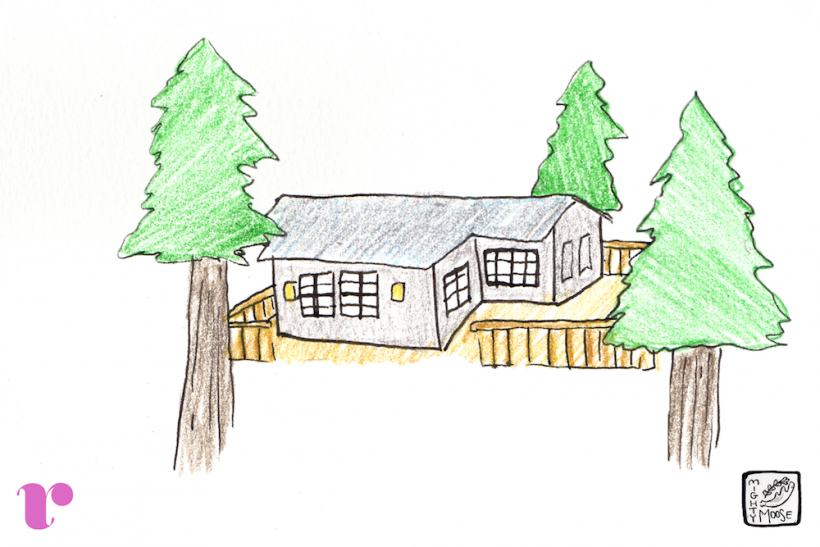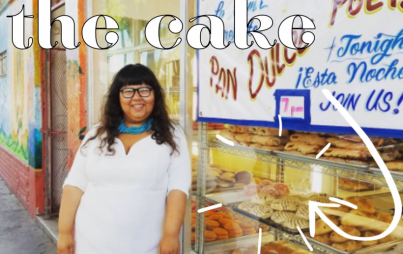
image credit: Mariah Aro Sharp @mightymooseart
Does the thought of sitting under a roof that you own (or that technically the bank owns, but you borrow for 30 years) sound like a dream?
Does the process of finding and figuring out a way to pay for that home make you feel like you want to vomit?
Me, too.
I’m on my third home purchase right now, which by no means makes me an expert. But, this last house is located in an area where you basically have to beg people to let you give them a million dollars, so I’ve learned a few things.
Take a Xanax and let’s go.
1. Before you do any house hunting, get yo' damn finances in order.
You can’t do anything without money, or at the very least, information ABOUT money. So let’s get that nightmare out of the way.
Financing is an article in itself, so I’ll just hit the high notes here. If you have NO flippin' idea what you’re doing, just call a mortgage broker that someone you know already knows and trusts. The last thing you need is some rando dude trying to give you a loan you can’t afford.
If you’ve already got a realtor, they can also help with this. If not, you can ask around or Yelp.
If you have SOME idea what you’re doing, begin with the following:
A. Fill a 16 ounce tumbler with Cabernet Sauvignon. Don’t try to drink white wine. This is going to take a while and no one wants hot Chardonnay.
B. Decide what you can afford by using a calculator like this.
C. Check your credit (do that here) and know what those numbers mean. Low credit scores don’t necessarily mean you can’t buy a house, but you might need more down/have a higher interest rate.
D. More wine and/or chocolate.
E. Look at statements for every bank/investment/retirement account you’ve got and download the two most recent. This is pretty easy to do from any bank website but it takes a while and is sort of a pain in the ass.
F. What are you going to use for a down? If you qualify for an FHA loan, you might need as little as 3.5% down. If not, you might need 10-20%.
Short on cash but want to get into the market? Have family or friends with cash? You can get a one time gift of up to $14,000.
Some employers/401(k) funds will let you borrow up to $50,000 from your plan and pay it back over time. You have to pay interest (around 4.25%, usually) but you pay the interest to yourself! So that’s a great deal!
Dealing with all the financial BS first, will save you a lot of headache once you decide to start looking in earnest.
Note: It’s a great idea to get pre-approved for a loan. Pre-qualified and pre-approved are NOT the same thing. You can get pre-qualified with basic info like how much money you make and a soft credit pull (one that doesn’t impact your rating at all). But to get pre-approved, you’ll need to actually fill out a loan application.
It’s worth it. Sellers will take a buyer with money in hand much more seriously than someone who is like “HMMM. We can probably afford this house. Maybe. BRBK?” No. No one likes that.
With the finances in order, we move on to finding a place.
2. Decide where you want to live.
Duh. This seems like a given but I mean REALLY decide.
If you’ve got kids and are worried about where they are going to get their education, Great Schools is a great resource. Pay special attention to your district lines, though, and then check the school itself. In more urban areas (like San Francisco), you may actually have to APPLY to public school. Which is good for diversity, bad for sanity.
Another great resource for finding out general information about your city or town is areavibes. Just pop in your zip code and you’ll get info on everything from schools to weather, cost of living and crime. You might not want to do this for the place you currently live. Exhibit A.
My current town:
LOOKS GREAT.
JK. Not awesome.
I can’t give areavibes a 100% rec though because the crime here isn’t actually that bad. But the WEATHER IS AWFUL. Gross.
The city we are moving to:
You’ll note it gets an ‘F’ for cost of living and employment BUT my husband already has a job 30 minutes away and the COL in Boulder Creek is much lower than the SF Bay Area in general.
So it’s sort of relative. Good tool to start with, regardless. Especially for those of you not living in the most expensive place in the world.
Like to ride your bike? Here’s a site that will find the most bike-friendly cities.
Beware of potholes:
And if you want to know how walkable an area is, there’s a site for that, too.
3. Decide what you want in a house.
Make a list of everything that is a must (number of bedrooms, bathrooms, size of yard, etc.), everything that you’d like but don’t require (a pool, for example), and finally, make a list of things that are an absolute nope.
It’s a good idea to prepare this list, in addition to the list of places you want to live, so that you can share that info with your realtor.
4. ANNND find a realtor.
Not just ANY realtor. Your realtor, and their ability to navigate the market, may be the difference between making an offer and actually having an offer accepted.
A good realtor will handhold you a little bit, without treating you like a moron (even if you are a moron.)
How do you find a great realtor? ASK AROUND!
I’ll tell you how I found my realtor (Michael Minson of Keller Williams SF), I didn’t have to even ask. That’s how good he is. Ravishly’s social media manager, Nicole, gave him high praise, and the rest is history.
I mean just look at his team.
That’s Michael in the pink tie. These people mean business.
There is no doubt in my mind whatsoever that Michael is, in no small part, to thank, for us winning the bidding war on our home (four offers!).
You should love your realtor.
If you don’t, find another one.
5. Find a house.
Your realtor will be looking for you, obviously. They’ve got the most up to date info about stuff that’s on the market or coming on the market. Zillow, Redfin, Trulia, etc. are all fun to look at, but none of them are a substitute for a real person who knows what you want and knows people who have it.
As an aside, what house-hunting app is the best (based on my own research and experience)?
That’s a tough one. Here is some app-specific data:
- Zillow has the best estimates of mortgage data. This info can vary greatly, but their calculator is very easy to use if you need or want to figure out just how much money you are going to be paying out of your ass.
- Realtor has the most listings over all. There will be houses here that you don’t see in other spaces at all.
- Trulia has the most comprehensive information about neighborhood stats, schools, etc. Houses are also easy to save and organize by area. Crime maps are color coded so you know if you see red, you should probably not look there unless you want someone to steal your car.
- Redfin has a great feature that allows you to keep track of open houses. It also has an easy to find Walk Score, an easy to navigate street view and allows you to quickly pop into to Google Maps for directions from any location.
6. See the house.
Have your realtor make an appointment, or go to an open house.
Take a notepad and a camera (I mean, if you HAVE a camera) or your phone. Takes lots of photos and notes.
If you walk in and hate the property immediately, leave. Unless you’ve already looked at 50 houses and you hate them all. This is a sign that you might be the problem.
7. Like the house? Make an offer.
Your realtor will talk you through this. How much do you offer? What contingencies do you want (these are like little insurance policies, ie. if X doesn’t happen then the offer is void)? How long of an escrow? And so on.
There is a lot of paperwork at this point and a lot of disclosures to read. The disclosures are like the novel of information about the house. They include everything from the home inspection to insurance info, land survey info, name a thing, it’s in there.
Is the house in a flood zone? It’s in there.
Did someone die in the house? It’s in there.
Not in there? If Jack Nicholson ever went crazy in it.
Our house had 215 PAGES of disclosures. That’s like a novel, but way less entertaining and way more stressful.
Ask your realtor for help.
7(B). Write a letter.
I know, it’s hard to believe that you’d have to essentially beg someone to let you GIVE them several hundred thousand dollars, but in places like Portland, San Fran, Seattle, that’s just what is going to happen.
Get ready to pull out the prose.
There were four offers on our house. They were all good. I don’t know if my letter made the difference, but it sure didn’t hurt.
Here it is:
Dear Owners Of The Home We Want Very Much To Purchase,
We are Matthew and Joni Edelman. We like long walks on the beach at sunset and your house. We have five great kids - three in college and two in grade school. We want to buy your home.
We currently live in the Central Valley, in a farming community. It's small-ish. And hot. Mostly hot. There are a lot of cows.
Matt works in San Jose and has been commuting for eight years. He spends a portion of the week there, coming home at the end of the week to to mow the lawn and clean the chicken coop before heading back to the bay again on Tuesday.
You might be wondering why I (Joni) don't clean the chicken coop. And that's a fair question. But I figure after raising five kids, I've done my share of poop.
Incidentally, I see there is a coop on the property, which is great because our kids have a really sweet attachment to our hens. (And also, we like eggs).
We've been planning this move since Matt started this commute in 2009, but we wanted to allow our older kids to finish high school with their peers. Alas, the time has come for us to find our forever home.
We're just not ready for big city life. We all feel happiest outdoors, amidst the water and trees, in a smaller community with other folks like us.
We're looking for a place where our children can play, and where we can finish raising our (now 38% smaller) family (and someday [a long looong time from now] our grandchildren). We'd love for that place to be 311 Reynolds Drive.
Thank you very much for considering us as the possible future lovers of your home.
Sincerely,
Matt and Joni Edelman,
The People Who Don't Want To Give Away Their Hens
Include a photo. Even if your market doesn’t demand a letter, wouldn’t you love to hear from a family who would love your home as much as you?
8. Wait.
The waiting is, as they say, the hardest part.
9. Offer refused OR Offer ACCEPTED!
Refused: Bummer. Cry. Drink more wine. Eat more chocolate. Wait.
The right house is coming.
Accepted: You’ll need to wire your earnest money (that’s like a deposit that says “we are planning on buying your house and won’t leave you empty handed”) to the escrow account. In our case, earnest money was 3% of the purchase price, but just because our market is SUPER competitive and houses hover around a million dollars a lot of the time.
If you’re not in a competitive market, you’ll usually have to put in $500-1000.
10. Get a loan.
You hopefully are pre-approved, but if you’re not, you need to be, like, yesterday. Call your mortgage broker ASAP (or your realtor might do this for you).
We just happened to use a mortgage broker that is married to our realtor, which worked out amazing for us. What better line of communication between broker and realtor than a marital one?
The guy we used in our most recent purchase has his shit to.ge.ther (Phillip Cannon at Guaranteed Rate, on his game 100% of the time).
You will be doing an absolute ass-ton of paperwork. Thankfully, most of it can be done electronically, but you will probably also find yourself on the phone a lot. You want your loan person to be on their game. Seriously, no time here for someone who isn't working their butt off for you. Invaluable.
11. Get insurance quotes.
You’re going to need homeowner's insurance. So go find that. Your loan people will need those numbers.
12. Get an appraisal.
This is just code for, “let someone look at the house and tell you if it’s worth what you offered.” This will be arranged by the involved realtor(s).
Most of the time this works out fine, sometimes the house doesn’t appraise, and then you’ve got a whole other set of things to worry about. Not talking about that here.
Once you’ve got your appraisal done and your loan set, you're just waiting.
13. Wait.
14. Wait.
(My mortgage broker sent me that, which is just further proof that he's perfect.)
15. Wait some more.
16. CLOSE ESCROW.
On the day you close escrow, you’ll go into the title company and sign one hundred million papers. If you have kids, get a babysitter or bring an iPad. If you’re going alone, bring coffee and possibly a sedative.
That’s it.
Sign all the papers. Get the keys. Move in.







